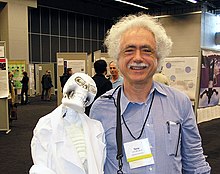Terry Winograd
Appearance

Terry Allen Winograd (born February 24, 1946) is an American professor of computer science at Stanford University, and co-director of the Stanford Human-Computer Interaction Group. He is known within the philosophy of mind and artificial intelligence fields for his work on natural language using the SHRDLU program.
| This article about an engineer, inventor or industrial designer is a stub. You can help out with Wikiquote by expanding it! |
Quotes
[edit]- If we assume that the person asking the question is serious, there is an underlying background of purposes and understanding (the 'horizon' as Gadamer calls it) into which the question fits. If a questioner were to ask "Can pigs have wings?" a respondent within the analytic tradition might have difficulty answering, because although the idea is outrageously farfetched, current work in genetic engineering does leave open the logical possibility of creating a beast with the desired characteristics. Admittedly, there might be some refuge in challenging the asker as to whether such a monstrosity would still properly be called a pig,11 thereby invalidating the question. But if the question were asked seriously, neither the logical possibility nor the precise meaning of "pig" would be the issue at hand. The questioner would be asking for some reason in some background of understanding and purpose, and the appropriate answer (just like the appropriate answer to "Is there water in the refrigerator?") would have to be relevant to that background.
- Understanding Computers and Cognition: A New Foundation for Design (1986, with Fernando Flores), p. 105.
- 11 See, for example Putnam's discussion of natural kinds in "Is semantics possible?" (1970).
- The main activity of programming is not the origination of new independent programs, but in the integration, modification, and explanation of existing ones.
- "Beyond Programming Languages", in Artificial intelligence & software engineering (1991), ed. Derek Partridge, p. 317.
- The techniques of artificial intelligence are to the mind what bureaucracy is to human social interaction.
- "Thinking Machines: Can there be? Are we?", in The Boundaries of Humanity: Humans, Animals, Machines (1991), ed. James J. Sheehan and Morton Sosna, p. 213
- Seekers after the glitter of intelligence are misguided in trying to cast it in the base metal of computing. There is an amusing epilogue to this analogy: in fact, the alchemists were right. Lead can be converted into gold by a particle accelerator hurling appropriate beams at lead targets. The AI visionaries may be right in the same way, and they are likely to be wrong in the same way.
- "Thinking Machines: Can there be? Are we?", in The Boundaries of Humanity: Humans, Animals, Machines (1991), ed. James J. Sheehan and Morton Sosna, p. 216.
- What surprised me, which Google was part of, is that superficial search techniques over large bodies of stuff could get you what you wanted. I grew up in the AI tradition, where you have a complete conceptual model, and the information retrieval tradition, where you have complex vectors of key terms and Boolean queries. The idea that you can index billions of pages and look for a word and get what you want is quite a trick. To put it in more abstract terms, it's the power of using simple techniques over very large numbers versus doing carefully constructed systematic analysis.
- "Talking with Terry Winograd", Ubiquity 3 (23), 29 July 2002.
- There is a tendency to throw computers at third world problems, which I think is often a distraction. Putting computers in the schools is great, but it may be more important to put teachers in the schools.
- "Talking with Terry Winograd", Ubiquity 3 (23), 29 July 2002.
- A reason to have computers understand natural language is that it’s an extremely effective way of communicating. What I came to realize is that the success of the communication depends on the real intelligence on the part of the listener, and that there are many other ways of communicating with a computer that can be more effective, given that it doesn’t have the intelligence.
- Interview in Bill Moggridge, Designing Interactions (2007), ch. 7[1]

